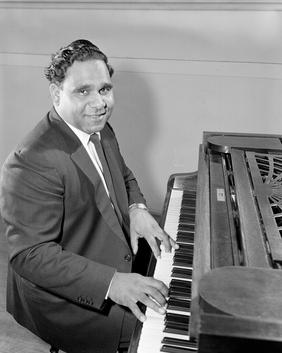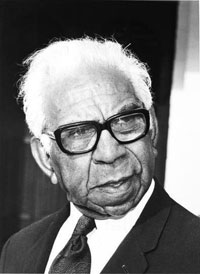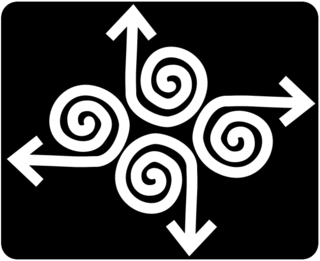Related Research Articles

Neville Thomas Bonner AO was an Australian politician, and the first Aboriginal Australian to become a member of the Parliament of Australia. He was appointed by the Queensland Parliament to fill a casual vacancy in the representation of Queensland in the Senate, and later became the first Indigenous Australian to be elected to the parliament by popular vote. Neville Bonner was an elder of the Jagera people.

Harold Blair was an Australian tenor and Aboriginal activist. He has been called the "last great Australian tenor of the concert hall era".
Warburton,Warburton Ranges or Milyirrtjarra is an Aboriginal Australian community in Western Australia, just to the south of the Gibson Desert and located on the Great Central Road and Gunbarrel Highway. At the 2016 census, Warburton had a population of 576.

Sir Douglas Ralph Nicholls was a prominent Aboriginal Australian from the Yorta Yorta people. He was a professional athlete, Churches of Christ pastor and church planter, ceremonial officer and a pioneering campaigner for reconciliation.

Aaron Davey is a former professional Australian rules footballer, who represented the Melbourne Football Club between 2004 and 2013. He is currently the Senior Coach of the Cairns City Lions, where he also served as a Player-Coach.

The Aborigines Progressive Association (APA) was an Aboriginal Australian rights organisation in New South Wales that was founded and run by William Ferguson and Jack Patten from 1937 to 1944, and was then revived from 1963 until around 1970 by Herbert Groves.

Stanley Vernard Grant SrAM is an elder of the Wiradjuri tribe of Indigenous Australians from what is now the south-west inland region of the state of New South Wales, Australia. The grandson of an elder who was gaoled for speaking his own language, Grant Sr now teaches the Wiradjuri language to students.

William Cooper was an Aboriginal Australian political activist and community leader; the first to lead a national movement recognised by the Australian Government.
The Aboriginal Advancement League was founded in 1957 as the Victorian Aborigines Advancement League (VAAL), is the oldest Aboriginal rights organisation in Australia still in operation. Its precursor organisations were the Australian Aborigines League and Save the Aborigines Committee, and it was also formerly known as Aborigines Advancement League (Victoria), and just Aborigines Advancement League.

The Dreamtime at the 'G is an annual Australian rules football match between Australian Football League clubs Essendon and Richmond.

William Townsend Onus Jnr was an Aboriginal Australian political activist, designer, and showman, also known for his boomerang-throwing skills. He was father of artist Lin Onus.
Fred Moore was an Australian activist for workers' rights, trade unionist and author who was associated with the South Coast of New South Wales, in particular the Mount Kembla area. He had a significant career in the mining industry for over fifty years.

Lewis William Arthur O'Brien, known as Yarlupurka, usually known as Uncle Lewis O'Brien, is an Aboriginal Australian elder of the Kaurna people.
Solomon David Bellear was an Aboriginal Australian public figure.

The Federal Council for the Advancement of Aborigines and Torres Strait Islanders (FCAATSI), founded in Adelaide, South Australia, as the Federal Council for Aboriginal Advancement (FCAA) on 16 February 1958, was a civil rights organisation which campaigned for the welfare of Aboriginal Australians and Torres Strait Islanders, and the first national body representing Aboriginal interests. It was influential in lobbying in favour of the 1967 Referendum on Aboriginal Australians. It was renamed to National Aboriginal and Islander Liberation Movement (NAILM) in the early to mid 1970s, before disbanding in 1978.
Joseph Daniel McGinness (1914–2003), known as "Uncle Joe", was an Aboriginal Australian activist and the first Aboriginal president of the Federal Council for the Advancement of Aborigines and Torres Strait Islanders (FCAATSI).
Pat Turner is an Aboriginal Australian of Gudanji-Arrernte heritage who has worked as a civil administrator for policies which guarantee the right to self-determination for Indigenous people. She was awarded the Order of Australia in 1990 for her service.
The Council for Aboriginal Rights (CAR) was founded in Melbourne in 1951 in order to improve rights for Indigenous Australians. Although based in the state of Victoria, it was a national organisation and its influence was felt throughout Australia; it was regarded as one of the most important Indigenous rights organisations of the 1950s. It supported causes in several other states, notably Western Australia and Queensland, and the Northern Territory. Some of its members went on to be important figures in other Indigenous rights organisations.
The Aborigines and Torres Strait Islanders Advancement League, (CATSIAL), also referred to as the Cairns Aborigines and Torres Strait Islanders Advancement League or Cairns Aboriginal and Torres Strait Islander Advancement League, and Aborigines and Torres Strait Islanders Advancement League (Cairns), was an Indigenous rights organisation founded in Cairns, Queensland in January 1960. It existed until the late 1970s.
Bruce Brian McGuinness was an Australian Aboriginal activist. He was active in and led the Victorian Aborigines Advancement League, and is known for founding and running The Koorier, which was the first Aboriginal-initiated national broadsheet newspaper between 1968 and 1971.
References
- ↑ Wainer, Jo; Richardson, Jan (26 October 2010). "Tireless warrior for Aborigines". The Sydney Morning Herald.
- ↑ "Stanley Davey Obituary (1922–2010)". Legacy.com.
- ↑ "Collaborating for Indigenous Rights". National Museum of Australia.
- ↑ "Mr Stanley Fraser DAVEY". Australian Honours Search Facility. Retrieved 5 January 2025.